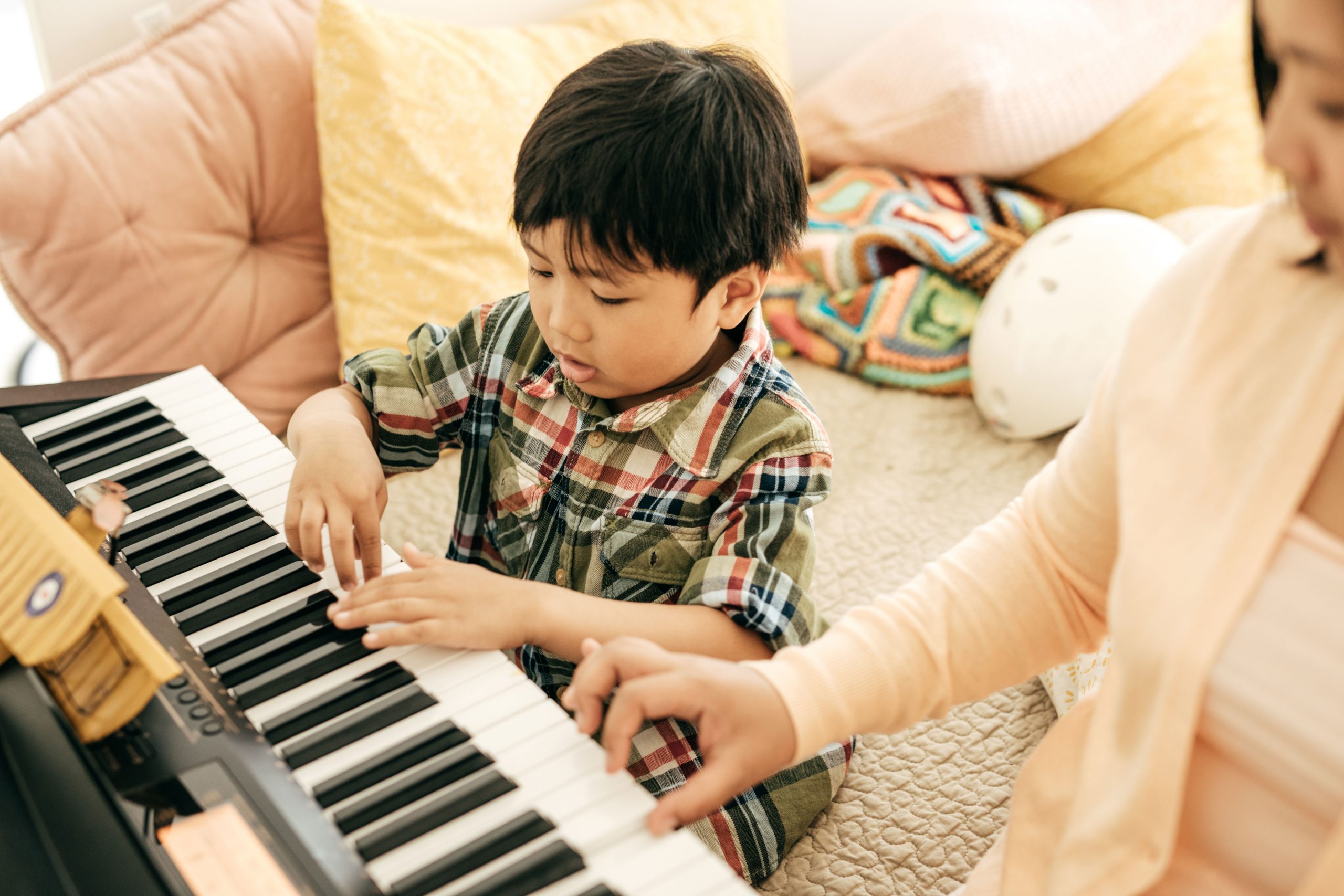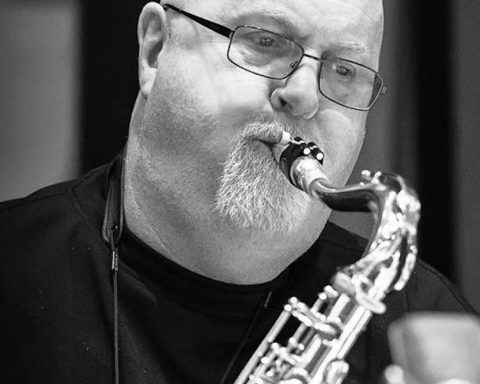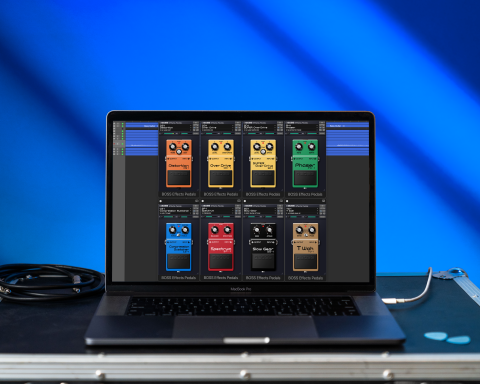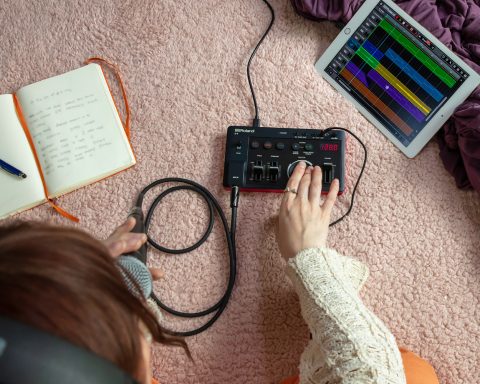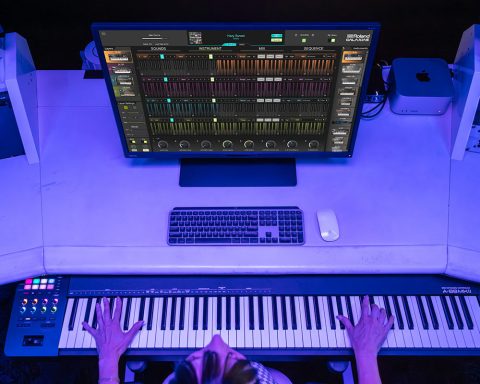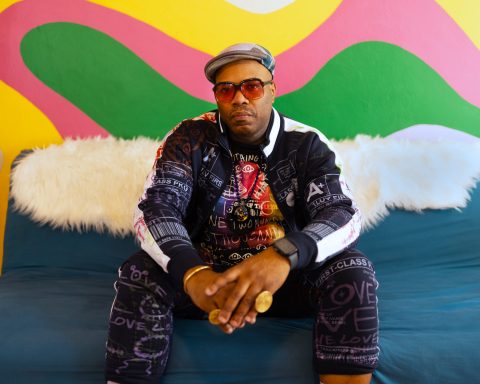Every parent wants the best for their child and it’s challenging to find positive activities that they will enjoy. Learning piano at a young age was one of the best things that I did in my life. I am grateful to my parents for supporting and encouraging me.
The piano is aligned with improved memory as well as math, social, reading, and comprehension skills. Simply put, playing piano encourages your child to use their brain, their physical coordination, and creativity.
Above all, playing piano taught me the pleasure of learning a new skill and the rewards of discipline. This, in turn, helped me with schoolwork and sports. It also gave me an appreciation of music and continues to add richness to my life.
Part One: Should My Child Play the Piano?
Why Play the Piano?
The piano is one of the world’s most popular instruments for many reasons.
- Educational and entertaining
- Easy to learn the basics
- Pleasure to play
- Rich, beautiful sound
The piano offers the entire tonal range of an orchestra at your fingertips. As a result, the piano is widely recognized as being the best primary instrument to learn.
For a budding player, the piano has a gentle learning curve. Importantly, it provides enjoyment and entertainment almost immediately. With a little practice, it’s possible to play nearly any song on the piano.
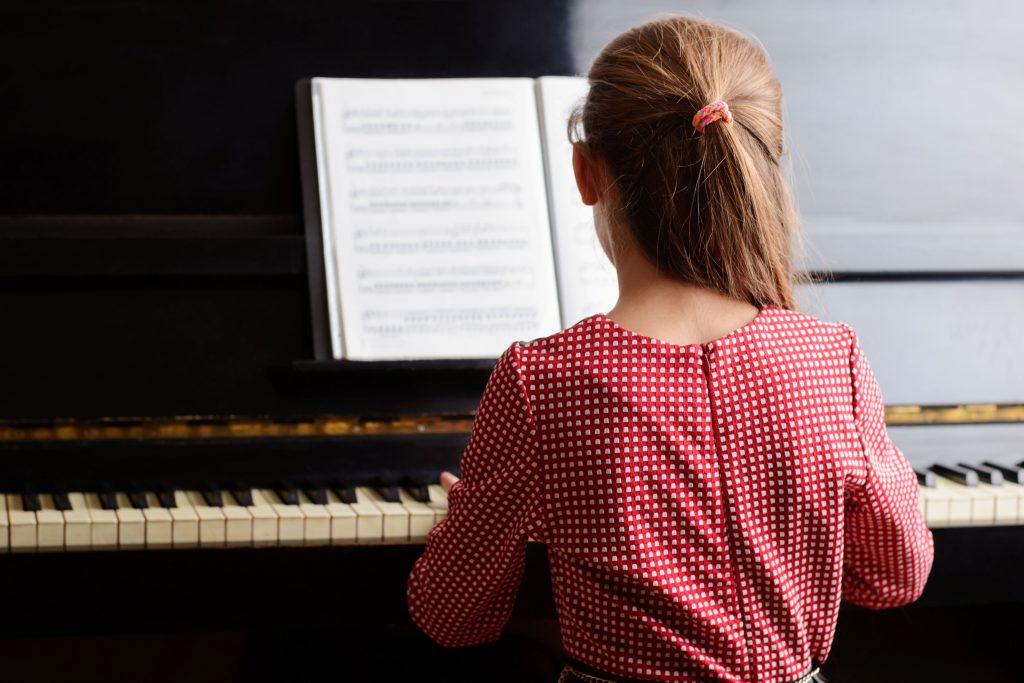
Benefits of Playing the Piano
There is probably no single skill more satisfying than being able to play an instrument well. As a parent, your decision to support your child’s musical development is one of the greatest gifts that you can give.
There are many benefits to learning to play the piano. In numerous studies about children who play an instrument versus those that don’t, there is considerable evidence in support of the fact that learning an instrument accelerates early cognitive development.
Music is a unique language that speaks to people of all ages. To be able to communicate with a crowd and give a personal interpretation of a piece of music is a great talent.
Is My Child Ready to Learn an Instrument?
If your child shows an interest in music and playing an instrument, that’s a huge start! With all of the distractions that kids have today, it’s wonderful when they want to learn an instrument.
One of the great things about music is its accessibility to everyone. Although some people have a natural gift for playing an instrument, almost everyone can play competently with practice.
The parent’s approach has a major impact on the natural commitment developed by the child. It is important to encourage your child and to have fun through games, playing the piano with others, and playing familiar songs that your child enjoys.
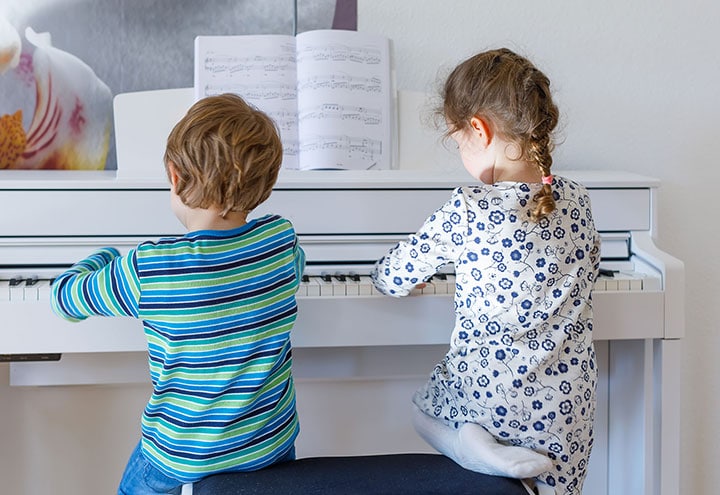
When Should a Child Begin?
We have all seen YouTube videos of 4-year-old prodigies playing complex classical pieces. Try to erase those from your mind. These children are very much the exception and their significant talent puts unnecessary expectations on your child.
For most of us, there are natural hurdles we should recognize. To begin with, the piano has 88 keys and was designed for adults to play. Children’s hands and strength need time to grow.
It is recommended that a child have access to a piano several years before beginning to formally learn the piano. Very young children (3-4 years) can enjoy playing with a parent or friend. Through this, they can become familiar with the instrument and gain confidence.
There are many great games and learning exercises that can be lots of fun in these early years. Importantly, this also imparts the sense that the piano is fun to play. Hopefully, this will set the stage for wanting to get better at playing the instrument themselves.
As a guide, it is generally accepted that between the ages six and eight years old are the best to start formal lessons.
Part Two: Getting your Child Started Learning Piano
Important Considerations
- The size of your child’s hand can be a determining factor. As a rule, your child should be able to stretch their hand across five white notes.
- Can your child move individual fingers? Play “Hot Cross Buns” on the black notes and have your child practice moving their fingers one at a time. This is fun to do together!
If they are unable to do this then they are not quite ready for formal learning. - A genuine interest in music and a desire to play the piano is important. If you want your child to learn but they aren’t really interested, you may confront issues over time. In short, learning the piano is a bit of a marathon. You need enthusiasm and commitment to go the distance.
Ask any teacher. Attention span is an issue or both children and adults if they aren’t interested in what they are doing or learning.
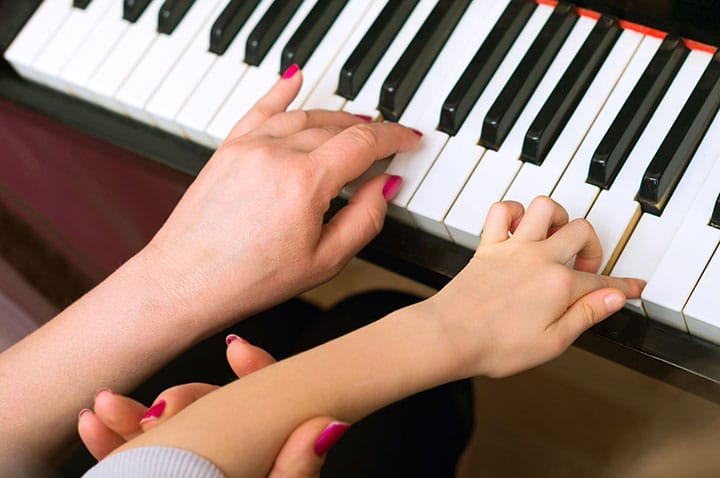
Keeping Things Interesting
Kids are often desensitized by television and computer games and expect to be entertained without having to work. Studies suggest the attention span of a child is their age plus 1 in minutes. A four-year-old will have a 5-minute attention span before looking for something else to do.
With very young students, lessons should last as long as you have their attention. This can be as short as 5 minutes and rarely longer than 15 minutes. With practice, and if the lessons are interesting, you will find that a 30-minute lesson is soon possible.
Practicing on their own may be wishful thinking until the student is over six. Children under 6 years old also have limited short-term memory. Whereas an adult can store 7-9 items in short-term memory, a child can only store 2-3. Be careful not to overload the child as it could backfire and create frustration.
Tips Before Your Child Starts Lessons
- Get a piano in the home for your child to practice/play with
- Provide a comfortable stool
- Play around on the piano together
- Listen to music together
- Sing together
- Dance together
- Watch live piano performances and performances on YouTube
- Play rhythm and clapping games
- Most importantly, establish realistic expectations
- Learn the alphabet from A-G and backward using cue cards
- Find a great teacher
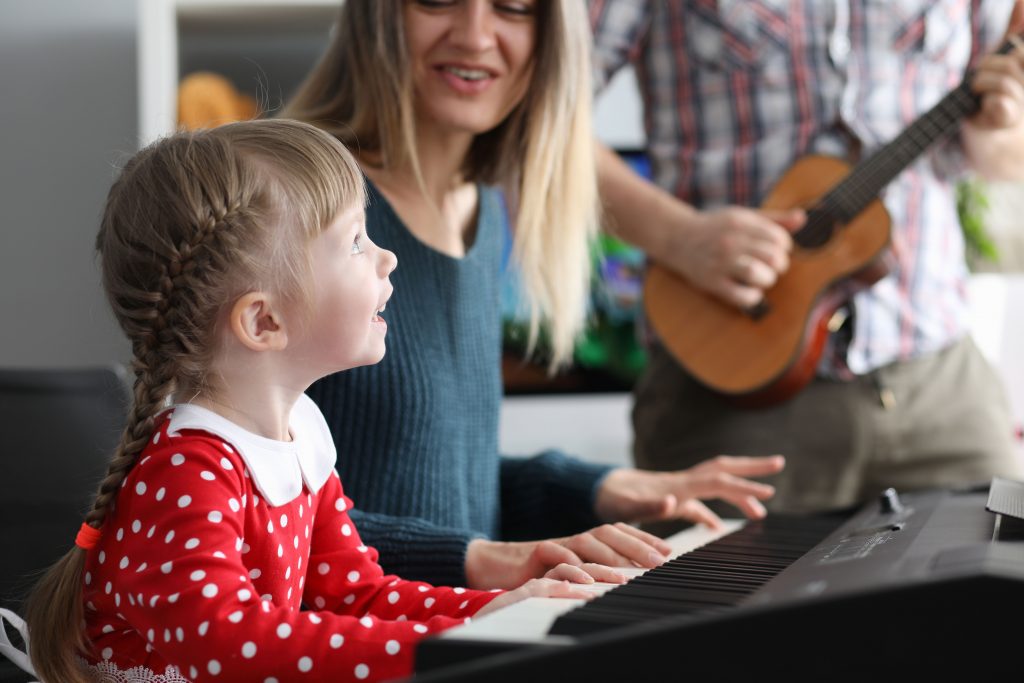
Fun Piano Games
There are lots of different things for your child to do on the piano. Depending on the age and the experience of your child, here are a few ideas that may be useful.
Encourage your child to play around with the piano, through storytelling and games. When they discover something interesting talk to them about it and expand on it. For example, talk about things like the black notes are in groups of twos and threes and the white notes make up the melody for
Do, Re, Mi, Fa, So, La, Ti, Do.
Experimenting is an important part of gaining familiarity and a personal connection with the instrument. Tell your child that keys each have a letter (name) and are in families (octaves). There are 88 keys on a piano. This can be intimidating, so let them get to know one family first. The octave staring at the middle is a great place to start.
Variety is the Key
Kids like counting. Imitate a metronome by counting and repeating 1,2,3,4. This introduces rhythm. For example, children can use clapping, a drumstick, or a note on the piano to participate.
Children under 5 can also learn away from the piano. For instance, reciting the musical alphabet forwards and backward using cue cards is useful. Sit at the piano together and try storytelling. Give names to the registers: Low notes can be Papa Bear, middle notes Mama Bear, and high notes Baby Bear.
As you can see, there is a lot that can be achieved well before your child begins to formally learn the piano. Singing (pitch), dancing (coordination), drumming (rhythm), and listening to music (composition and storytelling) are all very valuable. There are also Preschool music programs utilizing these techniques.
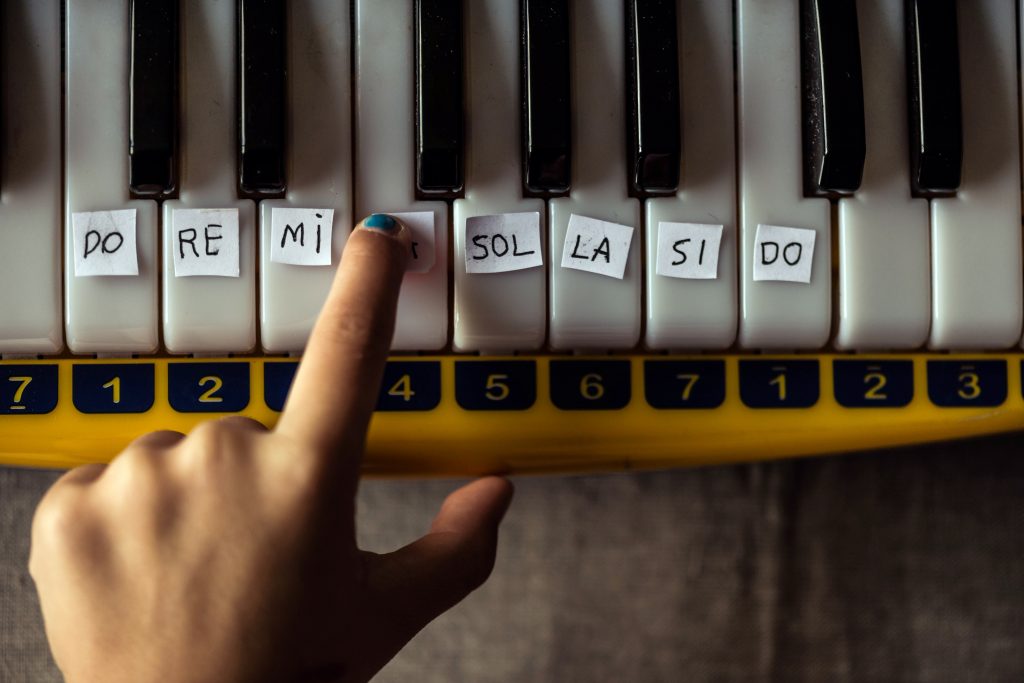
Part Three: Piano Lessons for Children
What Age Should a Child Start?
Most experts agree that the ages between six and eight years old are the best for most young students. At this stage, they have already had Pre-school and Kindergarten and have been taught by adults. Importantly, their hand and eye coordination are developed and they have the ability to understand basic theory.
Reading music is difficult for most children under the age of six. Be careful not to complicate and frustrate the child with learning notation before they are practiced with other forms of reading.
For young students, learning by memory can be useful. It gives them a sense of accomplishment and improves their dexterity and physical skills.
What Will Your Child Get from Lessons?
Formal lessons will help your child in many growth areas.
- Academic: Study practices, focus, mathematics, application of their thinking and practicing, memory
- Physical: Coordination and motor skills, ambidexterity (left and right-hand independence)
- Social: Playing with others and in groups requires consideration of the timing and volume of the other. This develops advanced listening skills.
- Self-Esteem: Self-confidence through developing talent and public performance
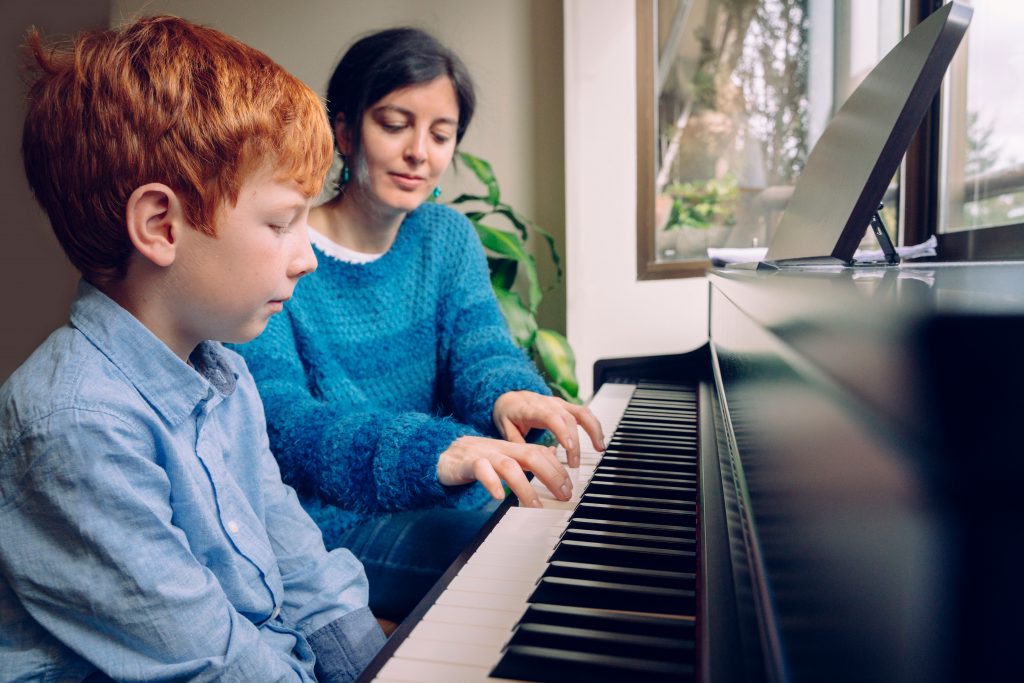
What Happens at a First Lesson?
The first piano lesson can seem a bit intimidating but there is really nothing to worry about. The initial focus is usually around getting comfortable with the teacher. The teacher will be assessing the students playing ability and discussing how the lessons and the practice will work.
First lessons usually involve an introduction to the piano and a walk around to understand the lay of the land. Naturally, there will also be discussions on any books and resources that will be needed.
Benefits of Regular Practice
Many students dislike the idea of regular practice. Therefore, a good mix of activities will keep things interesting.
Above all, try to sequence the practice activities in the correct order. For instance, things that take more brainpower should be done at the beginning of the lesson (new music). More familiar exercises like scales should be practiced at the end. Regular practice helps in many key growth areas.
- Muscle strength and dexterity
- Sight-reading
- Muscle memory and coordination
- Refined taste and emotions through playing
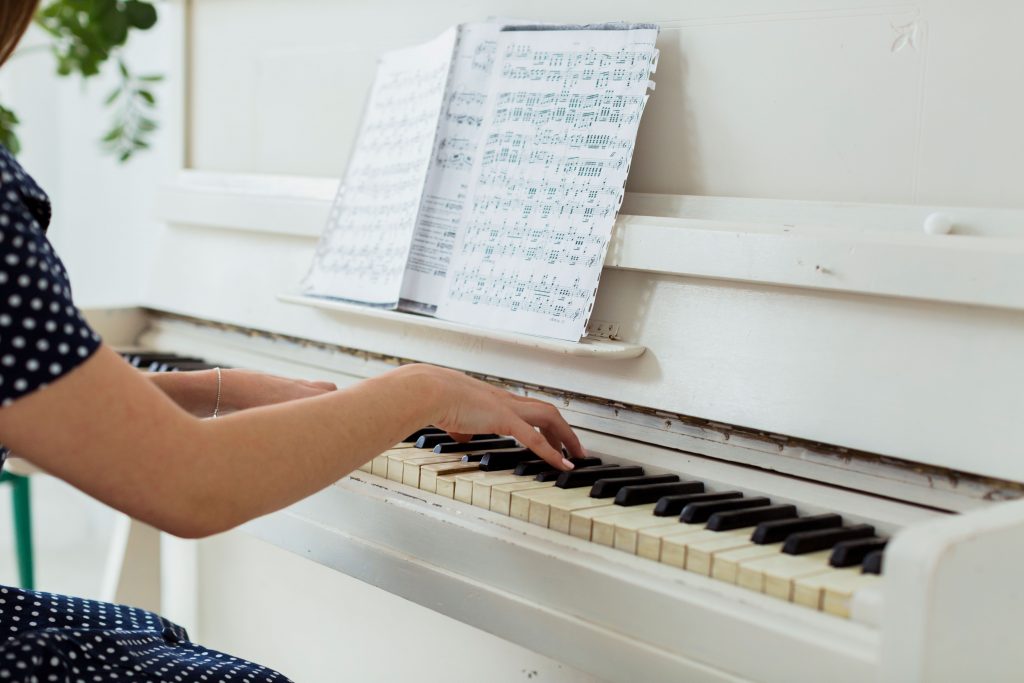
Does my Child Need to Practice Every Day?
There are two significant points relating to practice. First, regular practice is the only way to improve. Second, practice is only beneficial if the student is engaged
It is important to approach these ideas with some flexibility. For instance, if the student is resisting practice or taking shortcuts, the content of the practice might require a change.
It is always possible to add some variety. For instance, talk to the child and find out which parts of practice are the most enjoyable. It’s worth noting, a child will have difficulty retaining information and improving their playing skills if they are not enjoying what they are doing.
The parent’s involvement with the child is very essential, especially when they are young. Making practice an enjoyable habit is ideal. Above all, the length of the practice should match the child’s interests, goals, and attention span.
Part Four: The Advantages of Learning an Instrument
As Plato famously said, ”Music gives a soul to the universe, wings to the mind, flight to the imagination, and life to everything.” What a shame that Plato never played the piano.
As a student become more proficient, they may be invited to competitions and events. Most importantly, this will help them set goals and showcase their skills.
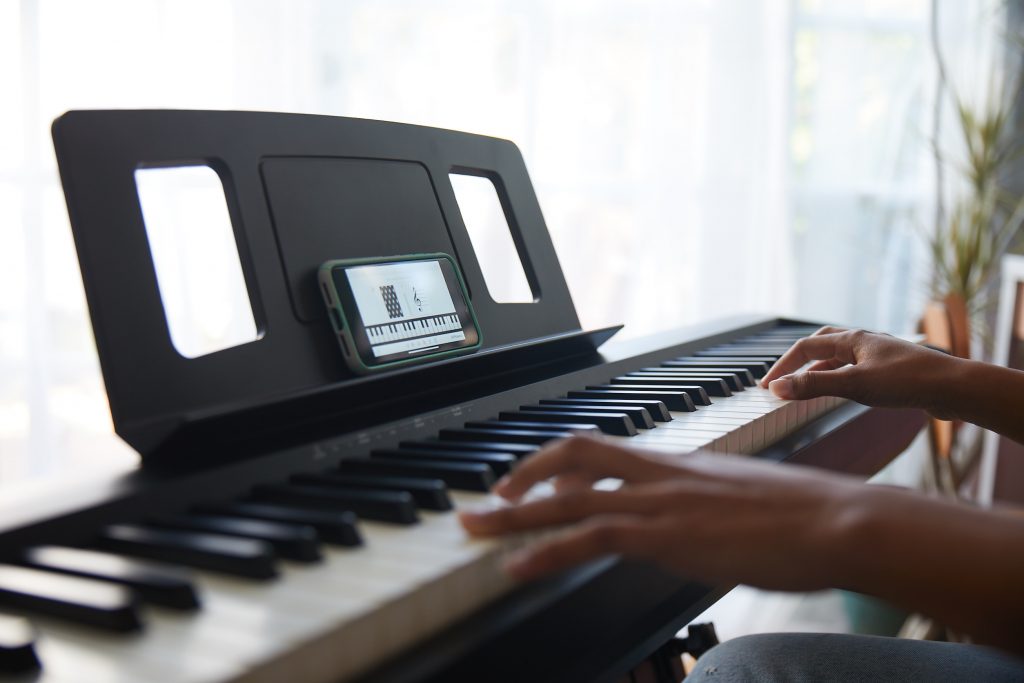
Recitals and Performance
Performing is an excellent way for your child to understand the benefits of hard work. Above all, having something to work towards is exciting and accelerates their musical growth.
A positive aspect of public performance is overcoming nerves on a regular basis. This is invaluable on a personal level later in life. Also, recitals and performances act as milestones and make it easier to recognize progress.
Benefits of Learning to Play Piano
- Improved brain capacity and cognitive skills
- Better short and long-term memory functions
- Improved listening skills
- Enhanced understanding of mathematics
- Accelerated language skills
- Improved reading comprehension
- Enhanced creativity
- Better time management and organization
- Improved concentration, discipline, and patience
- Better hand-to-eye coordination
- Better rhythm and coordination
- Improved self-esteem
- Increased cultural knowledge
- Improved social skills
Learning to play an instrument as a child is a great experience. It can be the start of a lifelong journey many will never take. I was lucky enough to grow up playing the piano. Over the years, the relationship I developed with the piano had a profound influence on my life. I love seeing young pianists begin their journey and thank my parents for affording me the same opportunity.

